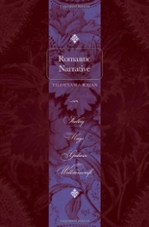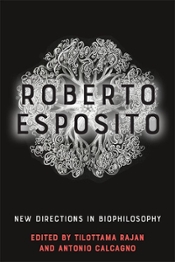 Tilottama Rajan
Tilottama Rajan
Roberto Esposito: New Directions in Biophilosophy
This collection invites readers to reposition Esposito’s thought and explore the interdisciplinarity and unique methodology of his whole corpus. It addresses Esposito’s long-standing engagement with early modern philosophy, philosophy of biology, biopolitics, and the impolitical and the impersonal, together with his significant dialogues with contemporary philosophers like Gilles Deleuze, Jacques Derrida, Simone Weil, Jean-Luc Nancy and Maurice Blanchot. A new essay by Esposito himself reveals the importance of philosophical sources and ideas that condition his thinking, especially outside and beyond the dominant biopolitical interpretative framework that has come to mark his reception in the English-speaking world. 2021, Edinburgh University Press.
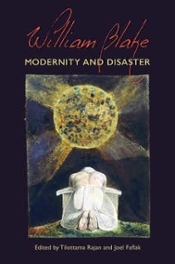 William Blake: Modernity and Disaster
William Blake: Modernity and Disaster
William Blake: Modernity and Disaster explores the work of the Romantic writer, artist, and visionary William Blake as a profoundly creative response to cultural, scientific, and political revolution. In the wake of such anxieties of discovery, including the revolution in the life sciences, Blake’s imagination – often prophetic, apocalyptic, and deconstructive – offers an inside view of such tumultuous and catastrophic change.
A hybrid of text and image, Blake’s writings and illuminations offer a disturbing and productive exception to accepted aesthetic, social, and political norms. Accordingly, the essays in this volume, reflecting Blake’s unorthodox perspective, challenge past and present critical approaches in order to explore his oeuvre from multiple perspectives: literary studies, critical theory, intellectual history, science, art history, philosophy, visual culture, and psychoanalysis. Covering the full range of Blake’s output from the shorter prophecies to his final poems, the essays in William Blake: Modernity and Disaster predict the discontents of modernity by reading Blake as a prophetic figure alert to the ends of history. His legacy thus provides a lesson in thinking and living through the present in order to ask what it might mean to envision a different future, or any future at all. 2020, Toronto University Press.
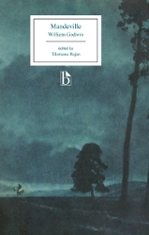 Mandeville
Mandeville
Mandeville (1817) is the fourth in the sequence of William Godwin’s major novels and is set in the revolutionary period between the execution of Charles I and the Restoration, a time when political government was being renegotiated through church government, and the only period when Britain was not a monarchy. The novel, which offers a different version of the historical novel from that of Walter Scott, is book-ended by two rebellions, the Irish Rebellion and the personal rebellion of Mandeville. Its shocking climax, on the threshold of the Restoration, defaces endings based on settlement and reconciliation.
Tilottama Rajan's edition (Broadview Press, 2015), the first easily available edition of the novel since its original publication, presents a new reading of the textual status and rhetorical effect of an ending that some see as leaving the novel unfinished. The edition includes a substantial Introduction, extensive historical annotation, and appendices which include Godwin’s 1809 ‘Fragment of a Romance’ (which he described as the germ of the novel); contemporary reviews; materials relating to the novel’s religious and political backgrounds in England and Ireland, both in the seventeenth century and in Godwin’s own time; and nineteenth-century writings on war, madness, and trauma, Broadview Press.
Romantic Narrative: Shelley, Hays, Godwin, Wollstonecraft
Often identified with its lyric poetry, Romanticism has come to be dismissed by historicists as an ineffectual idealism. By focusing on Romantic narrative, noted humanist Tilottama Rajan takes issue with this identification, as well as with the equation of narrative itself with the governmental apparatus of the Novel. Exploring the role of narrativity in the works of Romantic writers, Rajan also reflects on larger disciplinary issues such as the role of poetry versus prose in an emergent modernity and the place of Romanticism itself in a Victorianized nineteenth century.
While engaging both genres, Romantic Narrative responds to the current critical shift from poetry to prose by concentrating, paradoxically, on a poetics of narrative in Romantic prose fiction. Rajan argues that poiesis, as a mode of thinking, is Romanticism’s legacy to an age of prose. She elucidates this thesis through careful readings of Shelley’s Alastor and his Gothic novels, Godwin’s Caleb Williams and St. Leon, Hays’ Memoirs of Emma Courtney, and Wollstonecraft’s The Wrongs of Woman.
Rajan, winner of the Keats-Shelley Association's Distinguished Lifetime Award and a fellow of the Royal Society of Canada, is one of Romanticism’s leading scholars. Effective, articulate, and readable, Romantic Narrative will appeal to scholars in both nineteenth-century studies and narrative theory. 2010, Johns Hopkins University Press.
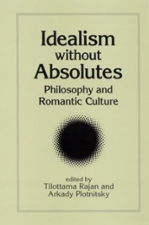 Idealism Without Absolutes: Philosophy and Romantic Culture (editor)
Idealism Without Absolutes: Philosophy and Romantic Culture (editor)
Idealism Without Absolutes offers an ambitious and broad reconsideration of Idealism in relation to Romanticism and subsequent thought. Linking Idealist and Romantic philosophy to contemporary theory, the volume explores the multiplicity of different philosophical incarnations of Idealism and materialism, and shows how they mix with and invade each other in philosophy and culture. The contributors discuss a wide range of major figures in the long Romantic period, from Kant and Hegel to Nietzsche, as well as key figures defining the contemporary intellectual debate, including Freud, Heidegger, Adorno, Lyotard, Derrida, de Man, and Deleuze and Guattari. While preserving the significance of the historical period extending from Kant to the early nineteenth century, the volume gives the concept of Romantic culture a new historical and philosophical meaning that extends from its pre-Kantian past to our own culture and beyond. 2004, SUNY Press.
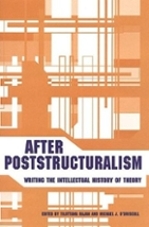 After Poststructuralism: Writing the Intellectual History of Theory (editor)
After Poststructuralism: Writing the Intellectual History of Theory (editor)
Every history of theory is simultaneously a theory of history. Rajan and O'Driscoll's wide-ranging volume tackles the issue of providing an intellectual history of theory, given a considerable continuity between theory and the history of ideas, and also given theory's own questioning of traditional intellectual historical models. The editors address this challenge by providing thirteen essays on a variety of theorists from Derrida to Zizek. Under the paradigms of genealogy, performativity, physiology, and technology, the essayists explore metaphors for connecting the work of theorists from different times, that are drawn from areas other than history, and that can enrich and revise our understanding of the histories of theory. 2002, University of Toronto Press.
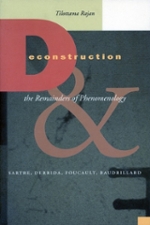 Deconstruction and the Remainders of Phenomenology: Sartre, Derrida, Foucault, Baudrillard
Deconstruction and the Remainders of Phenomenology: Sartre, Derrida, Foucault, Baudrillard
This book disentangles two terms that were conflated in the initial Anglo-American appropriation of French theory: deconstruction and poststructuralism. Focusing on Sartre, Derrida, Foucault, and Baudrillard (but also considering Levinas, Blanchot, de Man, and others), it traces the turn from a deconstruction inflected by phenomenology to a poststructuralism formed by the rejection of models based on consciousness in favor of ones based on language and structure. The book provides a wide-ranging and complex genealogy of French theory from the 1940s onward, placing particular emphasis on the largely neglected early work of the theorists involved and on deconstruction's continuing relevance. 2002, Stanford University Press.
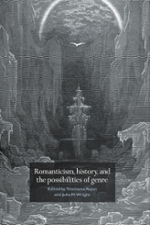 Romanticism, History, and the Possibilities of Genre (editor)
Romanticism, History, and the Possibilities of Genre (editor)
Romanticism has often been associated with lyric poetry, or otherwise confined within mainstream genres. As a result, we have neglected the sheer diversity and generic hybridity of a literature that ranged from the Gothic novel to the national tale, from monthly periodicals to fictionalized autobiography. In this new volume some of the leading scholars of the period explore the relationship between ideology and literary genre from a variety of theoretical perspectives. The introduction offers a fresh examination of how genre was rethought by Romantic criticism. 1998, Cambridge University Press.
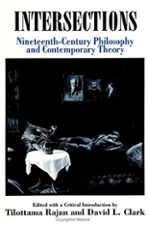 Intersections: Nineteenth Century Philosophy and Contemporary Theory (editor)
Intersections: Nineteenth Century Philosophy and Contemporary Theory (editor)
Focusing on nineteenth-century philosophers from Schelling and Hegel to Nietzsche, and on contemporary theorists from Derrida to Kristeva and Lyotard, the essays in this book suggest that the two areas are most similar at the points where they seem most unlike. Tracing the links of contemporary thought to its nineteenth-century precursors, the authors explore such issues as the re-theorizing of history and the subject, the limits and persistence of the metaphysical, and the ends of theory. 1995, SUNY Press.
The Supplement of Reading: Figures of Understanding in Romantic Theory and Practice
One of the aims of this study is to show how 'reading' the text is a partly figurative process, something about which scenes are staged and fictions constructed. But an equally important purpose is to show that romantic texts resist being read as language and ask to be treated as discourse. By including characterized readers and staging scenes of reading, they create a relationship with speaker, audience, and situation, and ask us to consider not simply the structure of signs but also the life of signs in literary communities and in psychic life. 1990, Cornell University Press.
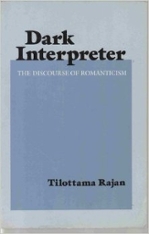 Dark Interpreter: The Discourse of Romanticism
Dark Interpreter: The Discourse of Romanticism
Rajan argues that Romanticism anticipates "the recognitions of existentialism and radical modernism" and that those recognitions can provide a framework for interpreting Romantic poems. Her central premise is the contention of modern theorists like Sartre, Derrida, and De Man that language cannot mediate between man's condition in the world and his desire for a better one. Building on that premise, Rajan reassesses the main Romantic genres, displacing, as the most important, romance with tragedy. She argues for a development in Romantic aesthetics which moves from quest romance, through irony, to rest in the sort of tragic vision detectable in The Triumph of Life and The Fall of Hyperion. Rajan's theoretical scaffolding takes issue with the reigning orthodoxy which claims that Romantic aesthetics can be best traced in Schelling and Hegel, who posit a theodicy which records a romance journey from a primal unity, through an alienation from nature and society, spiral- ling back again to a higher, renewed unity. Supported by the post-modern denial of such a unity because of the very nature of language, Rajan traces instead another tendency in German Romantic theory which begins with Schiller, passes through Schopenhauer, and culminates in the early Nietzche of The Birth of Tragedy. 1986, Cornell University Press.
